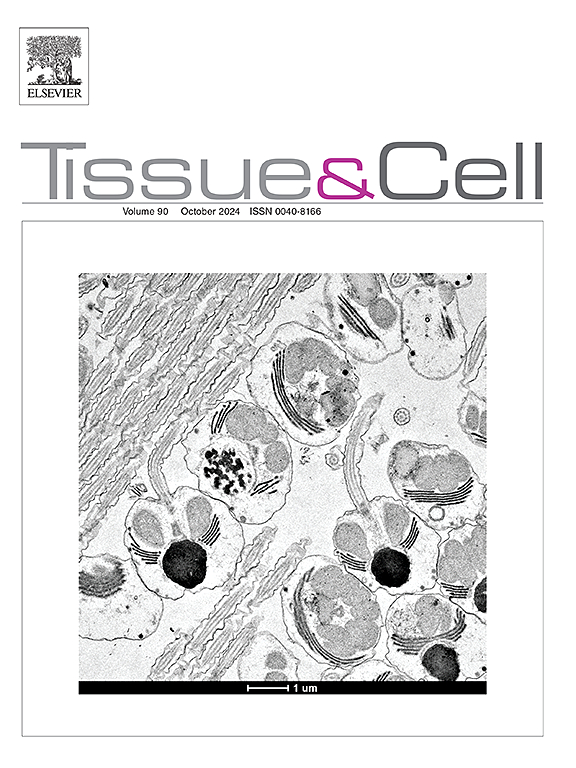Modulatory effects of oxytocin on normal human cultured melanocyte proliferation, migration, and melanogenesis
IF 2.7
4区 生物学
Q1 ANATOMY & MORPHOLOGY
引用次数: 0
Abstract
Melanocytes are specialized melanin-producing neural crest-derived cells. Melanocyte proliferation and melanin production (i.e., melanogenesis) are crucial for determining skin color. Disruption of these processes can cause pigmentary skin disorders, including hypo-pigmentary disorders such as vitiligo and hyper-pigmentary disorders such as melasma. Understanding these processes is important for discovering new targets to tackle these skin disorders. Therefore, this study aimed to investigate the effects of oxytocin (OXT) on melanocyte functions. Normal Human Cultured Melanocytes (NHCM) were treated with different OXT doses to investigate OXT effects and mechanisms on NHCM proliferation, migration, and on melanogenesis. OXT significantly increased NHCM proliferation and migration in a dose-dependent manner after 72 h of treatment. In addition, OXT dose-dependently upregulated melanogenesis-related microphtalmia-associated transcription factor, tyrosinase, tyrosinase-related protein (TYRP)-1, and TYRP-2 expression accompanied by an increased trend in melanosome number and maturation stage. Furthermore, OXT at concentrations (62.5–125 nM) increased melanin production. These findings suggest the involvement of OXT receptor (OXTR). In addition, this study demonstrates that OXT stimulates melanocyte proliferation, migration, with a tendency toward melanosome maturation, while it modulates melanin production in a dose-dependent manner. Thus, OXT system including its receptor OXTR may be a potential therapeutic target for skin pigmentary disorders.
催产素对正常人培养黑色素细胞增殖、迁移和黑色素生成的调节作用。
黑色素细胞是特化的黑色素生成神经嵴衍生细胞。黑色素细胞增殖和黑色素生成(即黑色素生成)是决定皮肤颜色的关键。这些过程的中断可导致色素性皮肤疾病,包括白癜风等色素减退性疾病和黄褐斑等色素增生性疾病。了解这些过程对于发现解决这些皮肤疾病的新靶点非常重要。因此,本研究旨在探讨催产素(OXT)对黑色素细胞功能的影响。用不同剂量的催产素处理正常人培养的黑色素细胞(NHCM),研究催产素对NHCM增殖、迁移和黑色素生成的影响和机制。经过72小时的处理后,OXT以剂量依赖的方式明显增加了NHCM的增殖和迁移。此外,OXT剂量依赖性地上调了与黑色素生成相关的小鳞癌相关转录因子、酪氨酸酶、酪氨酸酶相关蛋白(TYRP)-1和TYRP-2的表达,同时黑色素小体的数量和成熟阶段也呈上升趋势。此外,浓度为 62.5-125 nM 的 OXT 还能增加黑色素的生成。这些研究结果表明 OXT 受体(OXTR)的参与。此外,本研究还表明,OXT 可刺激黑色素细胞增殖、迁移,并有黑色素体成熟的趋势,同时它还能以剂量依赖的方式调节黑色素的生成。因此,OXT 系统(包括其受体 OXTR)可能是皮肤色素性疾病的潜在治疗靶点。
本文章由计算机程序翻译,如有差异,请以英文原文为准。
求助全文
约1分钟内获得全文
求助全文
来源期刊

Tissue & cell
医学-解剖学与形态学
CiteScore
3.90
自引率
0.00%
发文量
234
期刊介绍:
Tissue and Cell is devoted to original research on the organization of cells, subcellular and extracellular components at all levels, including the grouping and interrelations of cells in tissues and organs. The journal encourages submission of ultrastructural studies that provide novel insights into structure, function and physiology of cells and tissues, in health and disease. Bioengineering and stem cells studies focused on the description of morphological and/or histological data are also welcomed.
Studies investigating the effect of compounds and/or substances on structure of cells and tissues are generally outside the scope of this journal. For consideration, studies should contain a clear rationale on the use of (a) given substance(s), have a compelling morphological and structural focus and present novel incremental findings from previous literature.
 求助内容:
求助内容: 应助结果提醒方式:
应助结果提醒方式:


